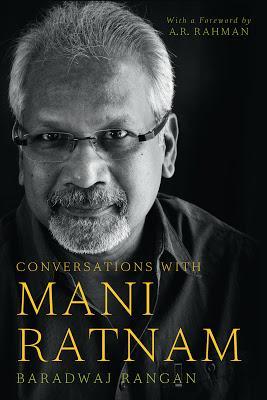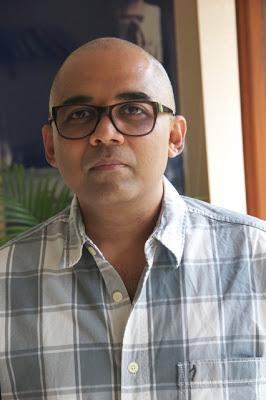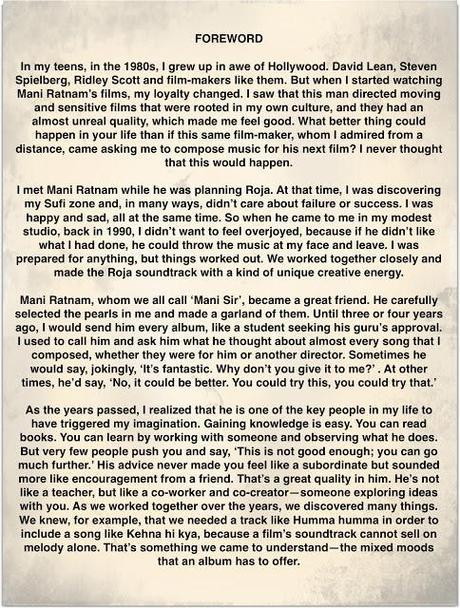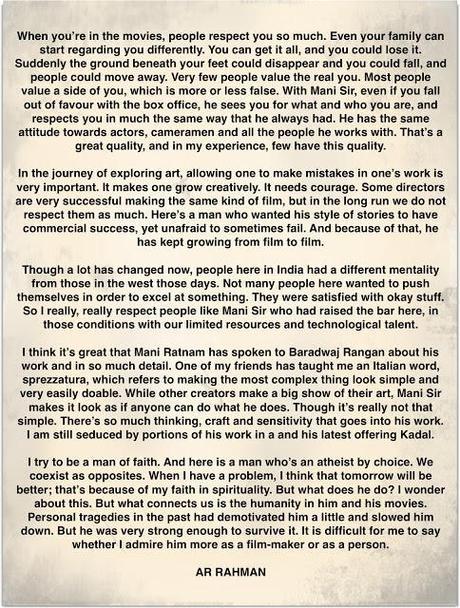 Having grown up
watching Mani Ratnam films, albeit his Hindi films, I welcomed the chance to
interview Baradwaj Rangan who in his book Conversations with Mani Ratnam (review) dissects, discusses, and divulges into the filmography of this prolific
director via a series of "freewheeling conversations".
Having grown up
watching Mani Ratnam films, albeit his Hindi films, I welcomed the chance to
interview Baradwaj Rangan who in his book Conversations with Mani Ratnam (review) dissects, discusses, and divulges into the filmography of this prolific
director via a series of "freewheeling conversations".
The book is a wonderful piece that proves to be a window into the mind of a director. Mr. Rangan obviously has a love towards Mani Ratnam's films, a love that showcases itself in the form of the passionate question and answer sessions that make the book a must for any film enthusiast.
I would like to thank Mr. Baradwaj Rangan for taking out the time to answer the questions put forth and for also helping me re-discover a director who has been an integral part of Indian cinema right from his very first film.

Baradwaj Rangan
Raghav Modi (RM) - In your book Conversations with Mani Ratnam you take on a novel approach on discussing the director's filmography. While memoirs have become common amongst the film industry off late, a conversational book like yours is still a lesser known commodity in our part of the world. Is this a change you hope to see more of?Baradwaj Rangan (BR) - The quick answer is yes. But it also depends on the filmmaker, and how open they are to talking. Ultimately no one is going to fully open up about everything, but are they at least committed enough to slog through questions about their career? And are they willing to genuinely engage in a back-and-forth conversation, which may sometimes be not-so-flattering to them? Those are the questions you need to answer before determining their fit for this kind of book.
RM - Mani Ratnam is one of the few directors who have influenced the movie going public of both regional and Hindi cinema. Still, his Tamil and other language films, besides Hindi, are not known amongst the Hindi cinema watchers. Why do you feel that while world cinema (subtitled non-English films) is so easily accepted in the North, we still struggle with regional films to get noticed across the country?
BR - One reason is surely the lack of subtitled prints. The only time I get to see Marathi or Bengali films is when I go to film festivals. What happens to these prints after they make the festival rounds? Why aren't they converted to DVDs? I've never found an answer to these questions. But even then, the number of people who seek out “foreign” films – in the sense of films that are in any language that’s foreign to their ears – is quite limited. The same people who check out French and Polish films will probably see these films, if subtitled. It’s still difficult to cross over to a larger market.
RM - Mani Ratnam is unlike a number of Hindi film directors who are very in-your-face with film promotion. He comes across as a person who would rather let his work speak. How easy or hard was it for him to open up to you and talk about films that are an integral part of his life?
BR - We just started talking, with no fixed agenda, and it slowly became a series of conversations. The fact is that he was open to this – and this openness, combined with a sense of comfort developed over time, made it easier for me.
RM - Indian audiences have become attracted to scandals and gossip when it comes to films and film-stars. Do you feel genuine artists like Mani Ratnam is at a loss as they stick to the conventional forms of film promotion? In fact he mentions in the book that for him going to premiers is a big ordeal as he would rather just release the film and get over with it.
BR - This is a question you’ll have to ask him. As you said earlier, he’s someone who’d rather let his work speak for himself. But no, I don’t think cheapening oneself with scandals and gossip is the way to go about it.
RM - There is a certain selfishness in your introduction as you almost feel cheated when Mani Ratnam went national with his films in the post-Roja era. Why and where do these feelings arise from?
BR - I thought this was all there in the introduction. There was this filmmaker making films only for us Madras kids (as it appeared), and we wanted more. And I don’t know that I would call this selfishness so much as self-centeredness.
RM - Conversations with Mani Ratnam is a very film-centric book that methodically discusses the films by the director and stays clear of any scandalous anecdotes. While it would attract film students and the die-hard film enthusiasts, the general reading public might not find it equally interesting. Was it a conscious decision taken by both of you to stay clear of gossip and name calling?
BR - I certainly was not interested in scandals and gossip, and if I’d asked him such questions, I wouldn't have been invited back for further sessions. This is about a filmmaker’s work, his mind, his thought process. And I do think that anyone interested in cinema will find this book easy to read. I didn't really pitch this book to someone who’s not interested in the work but only in the gossip.
RM - What and how did you research Mani Ratnam and his films before conversations with him commenced? Did it include watching and re-watching his films trying to pick on nuances and intricacies of his style or was most of it from your personal memories of having watched his films?
BR - Yes, it involved watching all his films a number of times. There were also memories, as you’ll find in the book.


Conversations with Mani Ratnam by Baradwaj Rangan. Penguin Viking/ Rs. 799,-
RM - Reading the book I came across so many Tamil/Malayalam/Kannada films being mentioned with stories that are simply unheard of even now in the Hindi film industry. Do you think Hindi cinema is still not brave enough to experiment with stories only taking on films to remake once they have proved successful in the South?
BR - I don’t know. There was always a parallel cinema tradition (the precursor to today’s multiplex system) in Hindi where strange stories were attempted. But not so much in the mainstream, as in Tamil and Malayalam. I think it’s also a question of scale. When you’re budgets are low, you can take more risks.
RM - Your chapter on Thiruda Thiruda ends a bit abruptly with Mani Ratnam stating that he doesn't remember a dialog you based your question on. Were there times during your conversations when you knew you had asked enough questions, pushed him to the limit, and it was time to move on?
BR - There was also a bit of shaping of the questions, so that there would be some dramatic impact even within a session. But yes, you have to know, sometimes, when you have hit a wall and when it’s time to move on.
RM - A lot of film makers complain that critics or even the general cinema going public tries to find meaning in everything on-screen even when there is none. For example you talk about the two versions of the theme song from Nayakam with one being "rawer" and the other "polished" and how it suggests the "eventual refinement of Velu Nayakan". Mani Ratnam is quick to point out that it is more of an "evolved" version of the song and "not necessarily the man who's become sophisticated". Do you think we as an audience are always looking for hidden meanings?
BR - I don’t know if I like the term “hidden,” which makes it look like the film is some kind of treasure hunt filled with a director’s clues. These interpretations come about by a need to resolve something. Let’s take this particular example. The thought process is like this. (a) This version of the song doesn't sound like the other version. (b) It is more polished. (c) What could be the reason? Now to some people, all of this won’t matter at all. They’ll just hear the other version of the song as is, without their brain asking them “why, why, why”? But if your brain is asking you that question, then you try to find an answer that can be supported with evidence from the movie. And I guess the answer I found was that this polished version is perhaps a reflection of the man himself, as he’s grown. Note that I am not saying that this IS the reason. I’m just saying that this is the reason that makes sense to me, and it doesn't matter to me what Mani Ratnam’s intentions were.
RM - I am unaware of the order in which the conversations took place, but reading the book there is a certain fluidity in the latter chapters and Mani Ratnam seems more at ease to the point he is even a bit brash telling you not to use Ram/Sita/Raavan in place of Dev/Ragini/Beera in your questions when discussing the film Raavan. Was it just him eventually getting comfortable with the entire setup?
BR - I think at that point he didn't want to talk about the mythical figures, which he had no control over. He had created only the film’s characters, and so he said let’s stick to those names.
RM - Having read the book, my first inclination is to try and watch some of Mani Ratnam's regional films and then maybe re-watch his Hindi ones, especially Raavan which I did not really like. Would you say this is pretty much the aim behind the book, to try and encourage the audience to appreciate the work of one of India's greatest film makers?
BR - The aim of the book is simply to peek into the mind of a MAINSTREAM filmmaker, to understand how and why he creates characters, how he uses songs, how he strives for “class” even while addressing a “mass” audience. Because far too many people dismiss this mode as a “thoughtless” mode, and as I am a big fan of this style of storytelling, I wanted to explore the thought behind each film. And yes, if you are prompted to pick up his other works, that’s a bonus.
RM - Mani Ratnam talks about not watching his films once they are released. Are you of the same notion when it comes to your writings or do you go back and rethink about what you have written and what would you have done differently given the chance?
BR - Oh I rarely go back and read stuff. Sometimes I know something is turning out well even as I’m writing it, but it rarely comes out the way you want, given all the time pressures, and I don’t like to put myself through the angst of finding a ton of mistakes and inelegant constructions.
RM - What is the one thing that you discovered about Mani Ratnam, either personal or about his films, during the conversations, that you were unaware of beforehand?
BR - I don’t know if it’s just the one thing. There are a lot of little details in his films that were fun to learn about, like the fact that they searched hard for train tracks that curved like a river for the opening of “Thalapathi.” I mean, how many filmmakers would bother about a detail like that?
RM - In the end, please tell us your top 3 Mani Ratnam films and what makes them essential viewing from your point of view?
BR - Instead of top three, let me go with the three Tamil films of his that you must see if you've not seen them. Nayakan, for the way everything came together. Iruvar, for the scope. And Kannathil Muthamittal, for its emotional trajectory. Happy viewing.
Thank you for the interview Mr. Rangan. I would also like to thank Mr. Arun Arora from Penguin India for initiating and helping organize the logistics of the interview.

